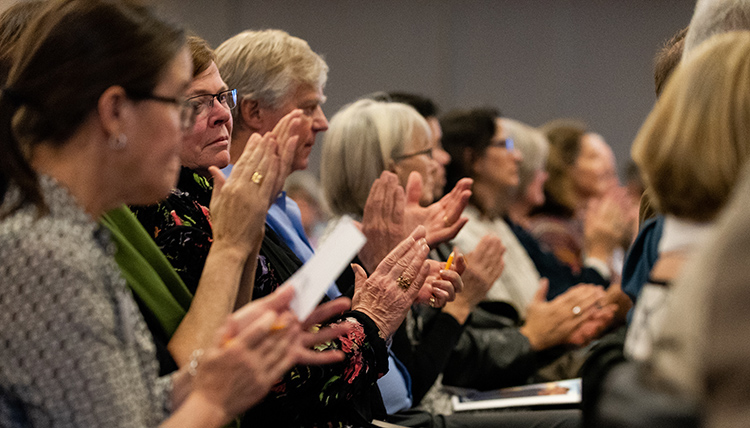N.Y. Times Journalist Nicholas Kristof Discusses Threats to Free Press

By Peter Tormey
SPOKANE, Wash. — Two-time Pulitzer Prize-winning journalist Nicholas Kristof of The New York Times described to a Gonzaga University audience Nov. 5 how quality journalism and the role of a free press in America — considered vital to a democracy — are threatened by economic and political forces.
“These are frankly dispiriting days in journalism when we feel like we’re in the middle of a war zone not only when we go to Afghanistan or Yemen or Syria, but right here at home. And it is kind of unprecedented in my professional life to have us accused of being the enemy of the people, not by some dictator abroad but by our own president,” Kristof told a packed audience at the Hemmingson Center.
“The attack on the Capital Gazette in Maryland that killed five journalists there. We had the pipe bombs going to a bunch of people, including CNN,” he said. Kristof also decried the slaying of The Washington Post columnist Jamal Khashoggi — whom he had known for 15 years — in the Saudi Consulate in Istanbul on Oct. 2, calling it “a real blow to journalism circles.”
“The idea of this gentle teddy bear of a guy walking onto a consulate of an ally of ours in a NATO country, while his fiancé was waiting outside, and having his fingers chopped off and being murdered and dismembered for his journalism — I find sickening and revolting,” he said. “And I think there was also a sense that that emerged out of an ethos in which journalism and journalists had become targets and were being denounced for political purposes.”

“News organizations around the country at the local level don’t have a clear business model” and desperately need support from their communities to provide the accountability and scrutiny necessary for our democratic government, Kristof said. He described “news deserts” in the United States where 171 counties are without a county newspaper and half of all counties have just one newspaper, typically a weekly.
“Cat videos will bring in audiences and a lot of serious reporting doesn’t,” he said, noting an almost “inverse relationship” between the recent reporting of which he is most proud and cares about the most — particularly humanitarian issues — and that which draws the largest audiences.
Kristof said his reporting in the past year of brutal mass atrocities in South Sudan has gotten virtually no attention. Although expensive and risky to cover, his audience plunged with those stories.
“My mom was the only one who read them,” he said.
Polling offers mixed lessons for journalism and news, he said. On one hand, a recent poll found that 85 percent of the American people agree that freedom of the press is essential for American democracy. However, strong polarization of opinion occurs when politics are inserted into the question, he said.
“Eighty percent of Republicans think that the press treats President Trump unfairly, almost no Democrat believes that. Almost a third of the American people agree that the news media is the enemy of the American people and that includes 48 percent of Republicans in the U.S.,” he said. “Twenty-three percent of Republicans believe that it’s OK for the president to shut down news organizations like The New York Times and The Washington Post. So there is a pretty fundamental trust issue.”
Kristof said he believes journalists failed in the 2016 presidential election to point out the gaps in truth between the candidates.
“I felt we blew it because the public believed, according to polls, that Donald Trump and Hillary Clinton both were untruthful at about the same level,” he said, noting that most reporters covering the campaigns believed Trump was much less truthful than Clinton.
The history of American journalism reveals a tension between truth and fairness, he said, noting that journalists like Edward R. Murrow correctly “pricked the balloon” of McCarthyism in the early 1950s, and did so again during the Civil Rights era by moving away from traditional journalistic tenets regarding fairness.
“It became clear that the public couldn’t really figure out where the truth lay so the reporters, somewhat belatedly, did guide people and tell them what was actually happening in cities during the civil rights marches and that was controversial and there was a lot of resentment,” he said. “In retrospect, I think it was generally conceded that truth was more important than fairness.”
The event was part of Humanities Washington’s statewide fall series, “Moment of Truth: Journalism and Democracy in the Age of Misinformation” featuring free events in Spokane, Seattle, Tri-Cities, Tacoma, and Yakima.
